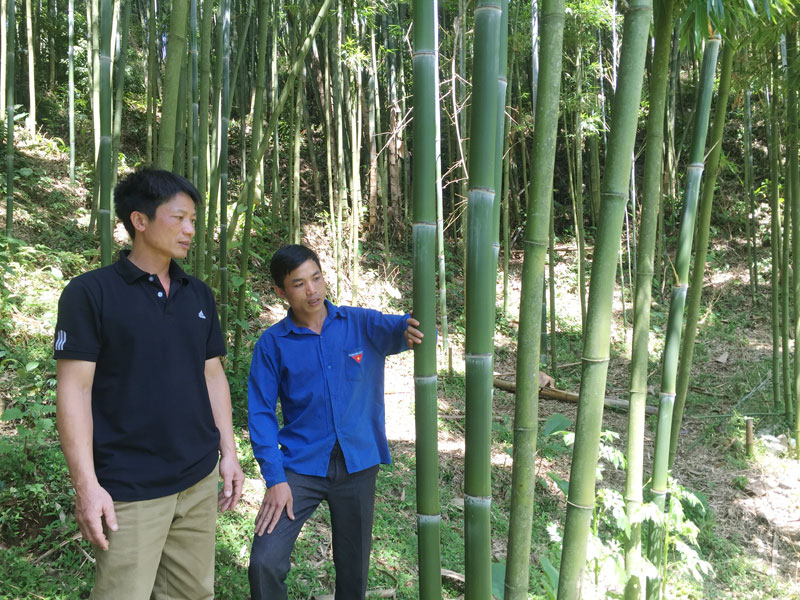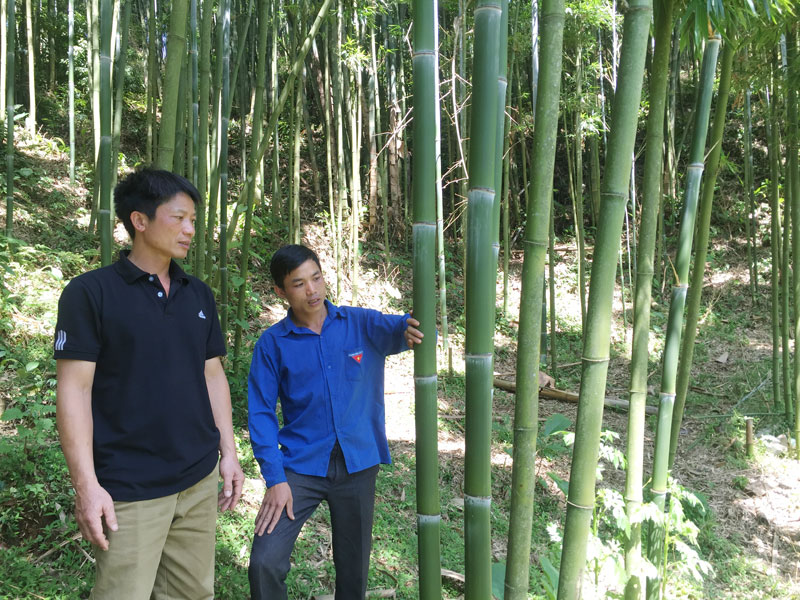
(HBO) - Along with agricultural production, people in Luong Duoi Village, Ngo Luong Commune (Tan Lac) have utilized favorable climate and soil conditions to develop the model of growing Vau trees in the expectations of raising income.

Vau trees contribute to increase the
income of the local people in the commune.
Through the common knowledge, Vau trees have
appeared in the commune for a long time and they have been planted in sloping
areas and areas with soil. The Vau tree area in Luong Duoi village has been
expanded to 100 hectares, occupying 2/3 of the total area of Vau trees in the
commune. In particular, many households in the village have expanded the area
and selected Vau as the key economic crops to bring high economic
effectiveness, typically as the family of Mr. Bui Van Bang, Bui Van Thuat, Bui
Van Quyen, etc.
We visited Mr. Bui Van Bang's family in Luong Duoi
village, one of the most effective growing Vau households. At present, the area
of Vau trees of Mr Bang expanded over 3 hectares and became the main source
of income of his family. Mr. Bang said:"In the past, my family developed a
maize-based economy, with a net profit of less than VND10 million a year, and
our living condition was very poor.Recognizing the economic value of Vau trees
in the surrounding area, I started to learn how to do and expanded the Vau tree
area with our hopes of income improvement. At the market price, Vau trees are priced at around VND10,000 / tree,
which can be sold partly each part of the trees according to the needs of
purchasing from the sellers. Specifically, Vau shoots are collected for food at
the price of VND 6,000-7,000 / kg. The Vau shells (also known as the Mo Vau) is
priced at VND 200 /one being used as a material for producing conical hats, the
body trees can be priced at about 7,000
VND for building materials and handicrafts. Thanks to the effective development
of the model, in 2017, my family earned a profit of 30 million VND. Only in
April and May of 2018, my family earned 12 million VND from the sale of the Vau
barks. Currently, Vau is sold mainly to traders From Hanoi, Hai Duong.
Mr. Bui Van Phong, the Chairman of the People's
Committee of Ngo Luong Commune said: "In the past few years, the model of
Vau tree growing in Luong Duoi village has brought about practical effects,
contributing to hunger eradication and poverty reduction. In the area, the
local people have planted more than 150 hectares of Vau trees scattered in the
villages.
According to data from the Hoa Binh Provincial Party Committee, the industrial production index for the first six months of 2025 is estimated to have increased by 20% compared to the same period last year. This marks the highest year-on-year growth rate for this period since 2020.
In the first six months of 2025, Hoa Binh province’s export turnover was estimated at 1.145 billion USD, marking an 18.11% increase compared to the same period in 2024. Import turnover was estimated at $ 804 million, a 17.15% increase, which helped the province maintain a positive trade balance.
The lives of the ethnic minority farmers in Tan Lac district have gradually improved thanks to the new directions in agricultural production. This is a testament to the collective strength fostered through the professional associations and groups implemented by various levels of the district’s Farmers’ Union.
With the motto the "product quality comes first,” after nearly one year of establishment and operation, Muong village’s Clean Food Agricultural and Commercial Cooperative, located in Cau Hamlet, Hung Son Commune (Kim Boi district), has launched reputable, high-quality agricultural products to the market that are well-received by consumers. The products such as Muong village’s pork sausage, salt-cured chicken, and salt-cured pork hocks have gradually carved out a place in the market and they are on the path to obtaining the OCOP certification.
In the past, the phrase "bumper harvest, rock-bottom prices" was a familiar refrain for Vietnamese farmers engaged in fragmented, small-scale agriculture. But today, a new spirit is emerging across rural areas of Hoa Binh province - one of collaboration, organisation, and collective economic models that provide a stable foundation for production.
Maintaining growing area codes and packing facility codes in accordance with regulations is a mandatory requirement for agricultural products to be eligible for export. Recently, the Department of Agriculture and Environment of Hoa Binh province has intensified technical supervision of designated farming areas and packing facilities to safeguard the "green passport" that enables its products to access international markets.



